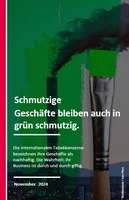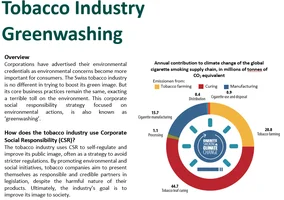Tobacco Industry Greenwashing
OverviewCorporations have advertised their environmental credentials as environmental concerns become more important for consumers. The Swiss tobacco industry is no different in trying to boost its green image. But its core business practices remain the same, exacting a terrible toll on the environment. This corporate social responsibility strategy focused on environmental actions, is also known as ‘greenwashing’. Key Facts
|
How does the tobacco industry use Corporate Social Responsibility (CSR)?
The tobacco industry uses CSR to self-regulate and improve its public image, often as a strategy to avoid stricter regulations. By promoting environmental and social initiatives, tobacco companies aim to present themselves as responsible and credible partners in legislation, despite the harmful nature of their products. Ultimately, the industry’s goal is to improve its image to society.
How bad is tobacco for the environment?
Tobacco has a disproportionate impact on the environment, as is detailed in our Tobacco & Environment fact sheet. The lifecycle of a single cigarette produces ~5.72g of CO2.
Greenwashing in Switzerland
Greenwashing comes in different forms targeted at different audiences.
Tobacco Waste CSR
Cigarette filters are the most common type of litter in Switzerland, with its plastic contents taking over ten years to degrade in the environment. Scientific studies have found that cigarette butts harm plant growth and poison fish. Cigarette filters, a single use plastic, do nothing to reduce the harms of cigarette smoking and so are simply a marketing trick.
Rather than stop using cigarette filters and take responsibility for their tobacco waste, cigarette companies have a long history of donating a sliver of their profits to public-facing anti-littering and cleanup campaigns. In Switzerland, the Federal Ministry for the Environment invited tobacco multinationals, lobby groups, and industry funded associations to propose solutions to tobacco waste. Tobacco industry solutions focus on “downstream” consumer behaviour, rather than the “upstream” solution of altering their products to be less harmful to the environment.

©Shutterstock
Used frequently by industries with negative societal impacts and reputations (i.e. gambling, petroleum, tobacco), CSR allows companies to set their own standards of social responsibility rather than being accountable for the true negative costs of their business.
Eco-Labelling
Tobacco companies have responded to consumer’s growing environmental consciousness by launching ‘green’ or ‘natural’ brands of cigarettes, such as Parisienne Verte. These can be packaged without plastic wrap and may even include non-plastic filters. However, the core product is still the same. The vast majority of the environmental harm of a cigarette happens before and after the consumer. Tobacco farming, which occurs mostly in developing countries, is labour-, pesticide-, and resource intensive, contributing to 5% of global deforestation each year. And even if a cigarette filter is not plastic, it still leaks pesticides and heavy metals into the environment when it is discarded. ‘Green’ labels are used to give an environmental veneer to a product without changing the ecological damage inherit to its lifecycle.
Recommendations
If Switzerland wants to stop the Tobacco Industry’s greenwashing and hold it accountable for the environmental damage they cause, it should:
- Implement an extended producer responsibility Scheme for tobacco waste that is not influenced by industry actors
- Prohibit the marketing of tobacco products as environmentally friendly by expanding the ban on tobacco labelling to include terms such as ‘eco-production’ or ‘green’
- Set a mandatory standard of environmental reporting and certification, to prevent it being used as a public relations tool

©Shutterstock
Environmental Certification
In promoting their corporate image, tobacco companies cite certifications by groups such as the ‘Carbon Disclosure Project’ attesting to their environmental sustainability and conscientiousness. These ratings are used to attract investors, but also feature on social media. In truth, these environmental certifications are entirely voluntary. Tobacco companies only disclose to certifying groups when the company believes it will help their brand. This leads to cases where a company receives “A-list” climate rating from a certifying body is advertised, but no disclosure is given on their forestry activities. These ratings are deceptive as they focus only on the operations of a company, without paying heed to the environmentally toxic product they sell.
03/2025
Downloads

©Shutterstock
Tobacco Industry Greenwashing

Fact Sheet - Tobacco Industry Greenwashing